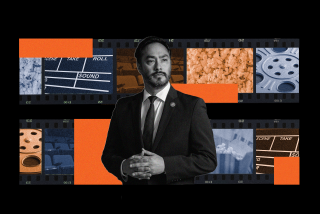Dr. Dre, Mister Rogers, Glen Campbell among 2020 Library of Congress recording inductees
Whitney Houston’s 1992 rendition of Dolly Parton’s hyper-romantic ballad “I Will Always Love You,” Dr. Dre’s groundbreaking rap album “The Chronic” from the same year, Glen Campbell’s 1968 heart-rending single “Wichita Lineman,” blues singer Memphis Minnie’s ribald 1941 hit “Me and My Chauffeur Blues” and the sportscast of the 1951 National League tiebreaker between the New York Giants and the Brooklyn Dodgers are among the latest inductees into the Library of Congress’ National Recording Registry.
The registry annually highlights 25 recordings spanning pop, rock, hip-hop, jazz, blues, folk, gospel, classical and world music as well as spoken word, comedy, news and sports recordings that reflect in some way the nation’s cultural, historical or aesthetic character.
The latest group spans nearly 90 years, from the Paul Whiteman Orchestra’s 1920 single “Whispering through Scottish percussionist Colin Currie’s 2008 recording composer Jennifer Higdon’s Percussion Concerto, and also includes the 1973 album “Mister Rogers Sings 21 Favorite Songs from ‘Mister Rogers’ Neighborhood.’”
“I’m very rarely without words, but I don’t really know how to react to it — it’s overpowering,” “Wichita Lineman” songwriter Jimmy Webb, 73, told The Times on Monday. “That’s history — real history.
“We all would like to think we have maybe some niche reserved in history, no matter how small, so people one day might look back and say, ‘I remember so-and-so,’” Webb said. “The Greeks believed that as long as your name was remembered that you never really die.”

This year’s class of inductees is a characteristically diverse group of recordings also including Tina Turner’s 1984 career-rejuvenating album “Private Dancer” and the 1964 Broadway cast album for the musical “Fiddler on the Roof.” It also includes Boston radio station WGBH’s broadcast of the Boston Symphony Orchestra’s performance on Nov. 22, 1963 that was interrupted by the announcement of President John F. Kennedy‘s assassination in Dallas, and conjunto musicians Narciso Martinez and Santiago Almeida’s 1936 polka “La Chicharronera,” a record credited with introducing accordion and bajo sexto into Mexican popular music.

The selection committee also bestowed its singular imprimatur of cultural significance on the Village People’s 1978 disco rave-up single “Y.M.C.A.”
“I had no idea when we wrote ‘Y.M.C.A.’ that it would become one of the most iconic songs in the world, and a fixture at almost every wedding, birthday party, bar mitzvah and sporting event,” lead singer and “Y.M.C.A.” lyricist Victor Willis said in a statement issued with the announcement of the 2019 selections.

Other choices include opera tenor Raoul Romito’s 1927 politically pointed recording “Protesto per Sacco e Vanzetti,” an episode of “Arch Oboler’s Plays,” a radio horror program from 1943, the 1953 recording of Puccini’s opera “Tosca” featuring Maria Callas and Giuseppe di Stefano and comedian Allan Sherman’s 1963 novelty hit “Hello Muddah, Hello Fadduh.”

Adding to the group are country-pop singer Eddy Arnold’s melancholy 1965 hit “Make the World Go Away,” the “Hiromi Lorraine Sakata Collection of Afghan Music” with nearly 50 hours of recordings spanning 1966 to 1973, English soul singer Dusty Springfield’s 1969 album “Dusty in Memphis” and Cheap Trick’s “Cheap Trick at Budokan” live album from 1978.
Completing the slate of new inductees are conductor Frederick Fennell and the Cleveland Symphonic Winds’ 1978 album with music of Holst, Bach and Handel, a groundbreaking audiophile project that was the first U.S. digital recording of symphonic music; Gothic Voices’ 1982 album “A Feather on the Breath of God” spotlighting music by 12th-century composer Hildegard von Bingen; Tejano singer Selena’s 1990 album “Ven Conmigo”; and the Maria Schneider Orchestra’s 2004 album “Concert in the Garden.”
This year’s elections were made through a combination of public input and recommendations from musicians, academics, critics and other music professionals in collaboration with the library’s National Recording Preservation Board.

The Recording Registry is an outgrowth of the passage by Congress in 2000 of the National Recording Preservation Act. Each year the Librarian of Congress oversees the selection of 25 recordings, which must be at least 10 years old at the time of induction, and deemed “culturally, historically or aesthetically significant.”
The latest group brings the total number of recordings in the registry to 550, a small fraction of more than 3 million items in the library’s recorded-sound collection, and about half the total of 6 million pieces also counting the film, television and other visual components.
More to Read
The biggest entertainment stories
Get our big stories about Hollywood, film, television, music, arts, culture and more right in your inbox as soon as they publish.
You may occasionally receive promotional content from the Los Angeles Times.











